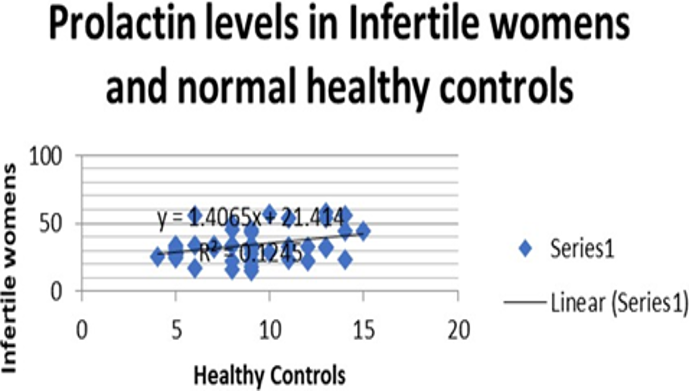Abstract
The World Health Organization (WHO) describes infertility as a disability for couples in childbirth to attain pregnancy within 12 months of daily sexual intercourse. The reproductive years of women starts when she starts her menstrual cycle during puberty and capacity to have a child typically ends about age (45) years. However, it may be possible for a woman to become pregnant before her cycles end with menopause. Infertility affects 13–20 per cent of couples worldwide, regardless of race or ethnicity. The present study aim was To study the levels of prolactin and beta hCG in female infertility. And To correlate the levels of prolactin and beta hCG in infertile womens and healthy controls. The present study was conducted in the departments of biochemistry and dept. of obstetrics and gynaecology. The study was conducted on two groups of 40 infertile Females and 40 healthy controls. Serum sample used for estimation of prolactin and hCG, assessed by dry chemistry analyzer. Serum prolactin levels in infertile females is 33.96±11.46 and hCG levels was 86.38±12.45, which was higher in infertile female as compared to healthy control with a p-value of<0.05. The present study concludes that Hyperprolactinemia is a major contributing hormonal factor in infertility among infertile women and, as such, prolactin and hCG should be measured in infertile women.
References
Al-Muhammadi, M. O., Al-Rubaie, B. J., Al-Emeedi, N. H. 2012. Physiological Study of Some Hormonal Parameters in Infertile Hyperprolactinemic Women in Pre and Post-Treatment with Cabergoline and Bromocriptine. Medical Journal of Babylon, 9(2):349–361.
Audu, D. T., Takim, A. O., Edem, C., Aernyi, R. I. 2013. Infertility and gender difference in reaction among couples and family and community treatment: a study of patients attending NKST hospital Mkar in Benue state, Nigeria. European Scientific Journal, 9(32):96106.
Balen, A. H., Rutherford, A. J. 2007. Management of infertility. BMJ, 335(7620):608–611.
Berinder, K., Hulting, A. L., Granath, F., Akre, O. 2007. Parity, pregnancy and neonatal outcomes in women treated for hyperprolactinaemia compared with a control group. Clinical Endocrinology, 67(3):393–397.
Boyers, S. P., Lavy, G., Russell, J. B., Polan, M. L., DeCherney, A. H. 1987. Serum prolactin response to embryo transfer during human in vitro fertilization and embryo transfer. Journal of In Vitro Fertilization and Embryo Transfer, 4(5):269–272.
Braunstein, G. D., Rasor, J., Adler, D., Danzer, H., Wade, M. E. 1976. Serum human chorionic gonadotropin levels throughout normal pregnancy. American Journal of Obstetrics and Gynecology, 126(6):678–681.
Chawla, R., Antonios, T., Berhanu, E., Ayana, G. 2012. Detection of Macroprolactinemia and Molecular Characterization of Prolactin Isoforms in Blood Samples of Hyperprolactinemic Women. Journal of Medical Biochemistry, 31(1):19–26.
Crosignani, P. G. 2012. Management of hyperprolactinemic infertility. Middle East Fertility Society Journal, 17(2):63–69.
Eldin, S., Abdelghani, A., Elmagadum, A. 2013. Hyperprolactinemia as a cause of female infertility and its prevalence in central Sudan. Egypt Acad. J.Biolog. Sci, 5(1):31–36.
Eze, B. I., et al. 2015. Thyroid Hormones and Prolactin Levels in Infertile Women in Southern Nigeria. Journal of Clinical and Diagnostic Research, 9(3):13–15.
Gronowski, A. M., Fantz, C. R., Parvin, C. A., Sokoll, L. J., Wiley, C. L., Wener, M. H. 2008. Use of Serum FSH to Identify Perimenopausal Women with Pituitary hCG. Clinical Chemistry, 54(4):652–656.
Hay, D. L., Lopata, A. 1988. Chorionic gonadotropin secretion by human embryos in vitro. The Journal of Clinical Endocrinology and Metabolism, 67(6):1322–1324.
Heinonen, P. K., Pystynen, P. P. 1983. Primary infertility and uterine anomalies. Fertility and Sterility, 40(3):311–316.
Kletzky, O. A., Rossman, F., Bertolli, S. I., Platt, L. D., Mishell, D. R. 1985. Dynamics of human chorionic gonadotropin, prolactin, and growth hormone in serum and amniotic fluid throughout normal human pregnancy. American Journal of Obstetrics and Gynecology, 151(7):878–884.
Majumdar, A., Mangal, N. 2013. Hyperprolactinemia. Journal of Human Reproductive Sciences, 6(3):168– 175.
Nallusamy, S., Gracelyn, L. J. 2016. Prevalence of hyperprolactinemia in infertile women and its association with hypothyroidism. International Journal of Advances in Medicine, 3(1):33–38.
Obiekwe, B. C., Chard, T. 1983. Placental proteins in late pregnancy: Relation to fetal sex. Journal of Obstetrics and Gynaecology, 3(3):163–164.
Poppe, K., Velkeniers, B. 2003. Thyroid disorders in infertile women. In Annales d’endocrinologie, 64(1):45–50.
Ratner, L. D., Gonzalez, B., Ahtiainen, P., et al. 2012. Short-Term Pharmacological Suppression of the Hyperprolactinemia of Infertile hCG- Overproducing Female Mice Persistently Restores Their Fertility. Endocrinology, 153(12):5980– 5992.
Rosato, F., Garofalo, P. 2002. Hyperprolactinemia: from diagnosis to treatment. Minerva pediatrica, 54(6):547–552.
Sanders, B. 2006. Uterine factors and infertility. The Journal of reproductive medicine, 51(3):169–176.
Shibli-Rahhal, A., Schlechte, J. 2011. Hyperprolactinemia and Infertility. Endocrinology and Metabolism Clinics of North America, 40(4):837– 846.
Steier, J. A., Bergsjo, P. B., Thorsen, T., Myking, O. L. 2004. Human chorionic gonadotropin in maternal serum in relation to fetal gender and uteroplacental blood flow. Acta Obstetricia et Gynecologica Scandinavica, 83(2):170–174.
Unuane, D., Tournaye, H., Velkeniers, B., Poppe, K. 2011. Endocrine disorders and female infertility. Best Practice and Research Clinical Endocrinology and Metabolism, 25(6):861–873.
Valvekar, U., Lakshmi, S., Kumar, A. N. 2016. Hypothyroidism and Hyperprolactinemia showed a positive correlation in women with primary and secondary infertility. Int J Reprod Contracept Obstet Gynecol, 5(7):2079–2083.
Wright, K. L. 2003. Defining infertility: what infertility means for clinicians and clients. Network, 23(2):4–6.
Zhong, Y. P., Shen, X. T., Ying, Y., Wu, H. T., Li, J., Qi, Q. 2012. Impact of transitory Hyperprolactinemia on clinical outcome of in vitro fertilization and embryo transfer. Journal of medical biochemistry, 31(1):27–33.
Zollner, U., Lanig, K., Steck, T., Dietl, J. 2001. Assessment of endocrine status in patients undergoing in-vitro fertilization treatment. Archives of Gynecology and Obstetrics, 265(1):16–20.
Authors

This work is licensed under a Creative Commons Attribution-NonCommercial-NoDerivatives 4.0 International License.

